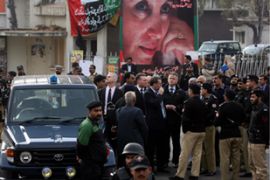UK police inspect Bhutto scene
British detectives start examining evidence in investigation into the assassination.

However, Benazir Bhutto’s security adviser told Al Jazeera that there were serious security lapses on the day Bhutto was killed in Rawalpindi.
“In all other places in Pakistan, the police used to be near the car … It [the car] used to be at a distance [from the people],” Dr A. Rahman Malik said.
“I still believe, if there was a deployment, a heavy deployment of police – about 300 or 400 people around the vehicle – the suicide bomber or the killer would not have been able to make it [to the vehicle].”
“It is something so tragic, we can’t just let it off, it is a security lapse,” he said.
Deeply flawed
The Scotland Yard detectives were invited by Musharraf, but officials from Bhutto’s Pakistan People’s Party (PPP) said it was simply an attempt to lend credibility to a deeply flawed official version of events.
|
Your Views |
|
Be Humble, United Kingdom |
Farhatullah Babar, PPP spokesman, said: “Musharraf has himself said the Scotland Yard team would not be allowed to question those we have suspected. So he has already circumscribed their role.
“We have respect for Scotland Yard but this is inadequate.”
On Thursday, when asked whether the UK police would be allowed to question politicians and an intelligence chief whom Bhutto had previously accused of plotting to kill her, Musharraf said there would be no “wild goose chase”.
In an article published on Saturday in The Washington Post, Bhutto’s husband said: “An investigation conducted by the government of Pakistan will have no credibility, in my country or anywhere else.”
“One does not put the fox in charge of the hen house,” he said.
The PPP has demanded a UN probe into Bhutto’s assassination, similar to the one into the murder of former Lebanese prime minister, Rafiq Hariri, in 2005.
The government, however, has ruled out such an investigation.
Independent investigation
Zardari urged “friends of democracy in the West, in particular the United States and Britain, to endorse the call for such independent investigation,” in his article.
“Those responsible – within and outside of government – must be held accountable,” Zardari wrote.
Bhutto’s death sparked violent unrest across Pakistan and set vital elections back six weeks to February 18.
Pakistan’s interior ministry blamed the attack on al-Qaeda and said Bhutto died from an accidental head wound sustained as she fell backwards when a suicide bomber blew himself up.
But party aides who were by her side at the time say she died from a gunshot to the head.
Asif Ali Zardari, Bhutto’s husband and now co-chariman of the PPP, refused to allow an autopsy before she was buried, saying “we know how she died”.
Economic impact
In the violence that erupted after Bhutto’s death, Pakistan has suffered a power deficit due to damage to two main power lines and low water levels at major reservoirs.
 |
| The government has ruled out a UN inquiry into the killing [AFP] |
All steel melting units across the country have now been shut for two weeks and hundreds of textile mills have been told to reduce operations to cope with an acute power shortage, a government official said on Saturday.
All business and shopping centres have also been told to close early.
Tahir Basharat Cheema, a senior official at state-owned Pakistan Electric Power Company, said water levels have fallen by up to 32 per cent in comparison to last year’s level, badly affecting the country’s generating capacity.
Almost 50 people were killed in the violence, mainly in Bhutto’s home province of Sindh, with initial government estimates showing almost $2bn in losses to the economy in the first two days.
Private power producers were also affected by violence in recent days. Railway engines and trains were torched during the violence, disrupting the transport of fuel to industrial and power units across the country.